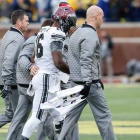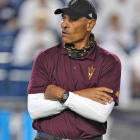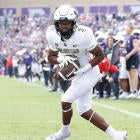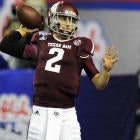The Big Ten has asked the NCAA to consider developing a national college football injury reporting system in reaction to the recent U.S. Supreme Court decision that allows states to legalize sports gambling.
The conference's athletic directors proposed to the NCAA Football Oversight Committee in June what would be a first-ever weekly national injury reporting mandate. The ADs claim an injury report is necessary to protect the integrity of the sport.
Such a move would alter one of the most ingrained and long-standing traditions in college football -- coaches concealing injuries. From the earliest days of the sport, the decision to release such information has typically been made by the coaches themselves, sometimes flying in the face of fair play and transparency.
With the cross-country growth of sports betting in its infancy, it is becoming imperative that injury information be accurate and widely available.
"We have to be more transparent," Ohio State AD Gene Smith said during a National Association of Collegiate Directors of Athletics panel last week. "In football, we're going to kill this [idea of] gamesmanship around injuries."
Smith added: "We don't know if we want to report as many days as the NFL, but clearly on Mondays if somebody is injured from Saturday and you know they're not going to play the following Saturday because they broke their leg, why not just say that?"
The NFL injury reporting policy was included in the Big Ten proposal for "context." The NFL requires its teams to release three practice participation reports during game weeks.
In addition, NFL teams are required to release a game status report on Friday (for Sunday games) and provide in-game injury reports. Broadcast networks commonly use those in-game reports, and bettors are able to act accordingly.
The Big Ten formed the proposal this May at its spring meetings in Chicago. It included input from coaches, presidents, ADs and faculty athletic representatives.
Sources tell CBS Sports that the oversight committee was receptive but tabled further consideration of the measure following its June meeting. It's not clear how soon the proposal could become permanent legislation as it first needs to be reviewed and approved by the committee.
"It would be a modified version of what the NFL has in place," Smith said. "If any of our members have any ideas, we need to get that in place now. I see some of these things being implemented to be pretty simple."
Coaches vary on their injury information policies -- from full disclosure to no disclosure. Some cite privacy laws. Others consider the release of injury information nothing more than a courtesy to the media and public. For decades, college coaches have leaned toward guarding knowledge of injuries as if they were part of the playbook.
"Whatever weaknesses or vulnerabilities that we have as a team, I can't possibly fathom why I would have any interest in revealing that to my opponent," Washington State coach Mike Leach told USA Today in January.
A national injury reporting mandate, though, seems to have some early support.
"All the coaches won't like it," UCLA AD Dan Guerrero said. "That's OK. But if everyone does it? Yeah."
The main issue is how to get around student privacy laws -- most notably the Health Insurance Portability and Accountability Act (HIPAA). Essentially, athletes would have to consent to have their injury information released publicly.
"It could be interesting," Guerrero added. "If you don't get 100 percent of your players willing to allow you to do it [then it could be a problem]."
Administrators across the country are concerned not only about the new legal landscape but the dissemination of accurate information from their programs. Several at the NACDA convention complained that sports gambling puts more pressure on them and their schools.
Since the 1940s, there has been at least one gambling or point-shaving scandal in college sports for eight consecutive decades. The last was the San Diego basketball point-shaving scheme during the 2010 season.
Administrators everywhere are asking themselves: Does legalized sports gambling increase or lessen the chances of such scandals?
"It's a great concern because it's unknown," Ole Miss AD Ross Bjork said. "Frankly, we're … talking about something that we really don't know exactly what the impact is yet."
With sports gambling now legal, it's more important than ever that games be perceived as "clean" to both the public and sports books taking bets. That's a big reason the NFL has mandated injury reports since 1946 after then-NFL commissioner Bert Bell suspected a pair of New York Giants of taking bribes.
"When we think about information, it's not just injury," Naima Stevenson, an NCAA deputy legal counsel, explained at the NACDA convention. "Who just broke up with their girlfriend? That might cause them not to have their best game. That kind of information students will have easy access to … is going to have a value associated with it now, which is just a scary thought."
Big Ten sources told CBS Sports that the league considers itself out in front on the issue as it is concerned with the possible negative impact of new gambling laws. As such, there are understandably heightened concerns about everything from point spreads to the credibility of officials.
"When your football coach gets up there on Monday at his press conference and he says, 'The quarterback is out of the game. The left tackle has a banged-up knee, he's day-to-day. The defensive back is day to day,' What happens with [that] sharing of information [with] people that are setting these lines in our state?" Smith asked.
We'll know soon. Delaware was the first state to open a sports book in the aftermath of the Supreme Court ruling. Gambling officials in Mississippi initially said they could have the infrastructure for sports gambling in the state set up within 45 days of the May 14 decision.
For decades, Nevada has boasted the nation's largest sports gaming operations, which began in the 1940s.
College administrators are also concerned about what is essentially an open loop of betting information. They would have to account for more than 100 football players, plus trainers, graduate assistants, student assistants, tutors and analysts who could potentially have inside information that may be shared not only internally on large campuses but externally with outside sources.
"I'm deeply concerned about it because I believe it could blow up college sports," said Tom McMillen, a former U.S. Congressman and current CEO of the Lead1 Association, which represents FBS ADs. "… If it blows up, it's going to cost a university a billion dollars in good will."
The NCAA said last week it would not seek so-called "integrity fees" from sports gambling. The idea of these fees gained traction after the Supreme Court decision. Some schools hinted they might want part of a state's gambling "handle" to beef up compliance staff.
To date, Marshall and West Virginia are the only FBS programs that have come to an agreement with their state government for an integrity fee.
The NCAA was a plaintiff in the suit fighting New Jersey's state gambling law that eventually was supported by the Supreme Court.
"Anything that looks like … we're trying to capitalize on [the change of the law] makes it a challenge for the association," Stevenson said.





















